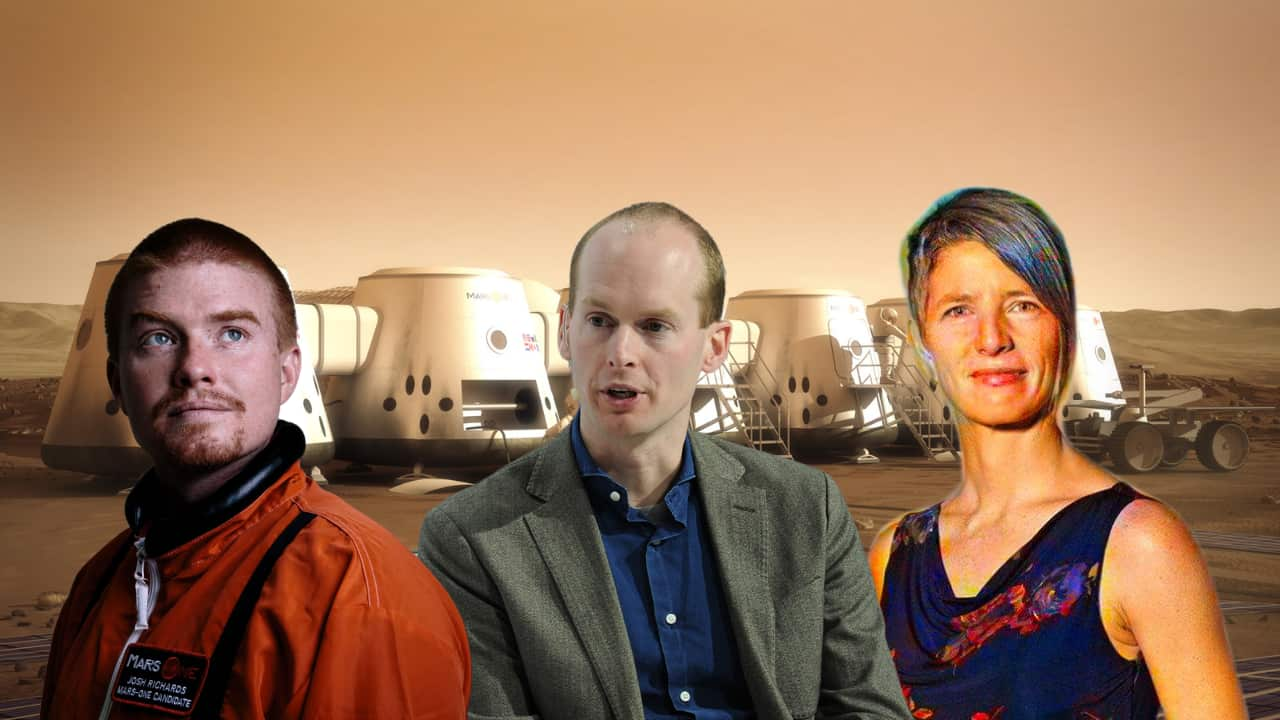The first of 100 applicants were supposed to have arrived on Mars by 2023. It’s now 2025, and there are no human colonies on Mars. What happened?
‘The Mars 100’ vying for a chance to leave Earth
Applications for Mars One opened to the public in 2013. It involved a motivational letter, a resume and a video submission. Media attention quickly grew around the people who were willing to say goodbye to their loved ones and take the one-way trip.
“This was me making an active decision to leave the planet.”

Richards delivered several talks relating to the Mars One project. Source: Supplied
As hype grew, scepticism followed. After its announcement, Lansdorp went on Reddit to do “Ask Me Anything’s” — answering questions from members of the public. But distrust quickly spread, with people questioning the budget and suggesting it was a scam.
An audience comparable to the Olympics
“The International Olympic Committee makes about four billion [US dollars] from sponsorships and broadcasting rights — so that’s two-thirds of a Mars mission,” Lansdorp told Engadget in a 2014 interview.

Mars One CEO Bas Lansdorp speaking to Engadget in 2014 as hype around the project grew. Source: Supplied / Bryan Bedder
“We will find the best people for this job and we will see how they perform that job — just like we watch the top of the world in the Olympics.”
But in 2019, after years of minimal news or announcements from Mars One, applicants received an email informing them that their dream was over: the project was bankrupt.
“Personally, the longer it went on further past 2016, the more the doubts went; ‘hey, maybe this particular project isn’t going to happen. Maybe it’s going to be a jumping off point for someone else,” he said.
Maybe it’s going to spur some other discussion or someone else picks this up.
Volunteering for death
“That kind of acceptance of death was something that I’d come to terms with years before … comfortable with the idea that I was living; doing something that made a difference.”
“Could we restart again from a really positive learned experience, especially from the perspective of sustainability, but can we also look at the way that we govern ourselves? Can we look at the way that we welcome diversity?”

Dianne McGrath spent several years of her life preparing for a life on Mars. Source: Supplied
For many applicants, the project consumed their lives. Richards said he and about 30 other finalists, including McGrath, met up for talks, team-building and exercises.
“I think what was missing was the hard psychological testing. These people were volunteering to go to their deaths, with the only people they will know being others who have also made that choice.”
The death of the Mars One dream
Just a year earlier, he delivered a TEDx promoting the project.

A concept image from Mars One of how a human colony may look on the red planet.
The cost for the one-way trip was estimated at $6 billion USD (almost 10 billion AUD in today’s currency) — however estimates of such a mission by NASA have come to more like $500 billion USD.
Former Mars One ambassador and theoretical physicist Gerard’t Hooft told The Guardian in 2015 that the project’s budget and schedule were off by a factor of ten.
What’s next for a mission to Mars?
“The balance of interest has moved away from Mars towards the Moon, partly because the Moon is proving more difficult than people may have expected,” he said.

Elon Musk has said SpaceX have sights set for Mars by 2040. Source: Getty / Chandan Khanna
“All that Apollo stuff in the sixties might’ve given us a false sense of what we’re capable of. And there’s got to be a bit of a rethinking about optimism, perhaps.
“The fact that it [Mars One] existed as a proposal meant that people needed to make concrete criticisms of it, which were useful in developing the way forward.”
